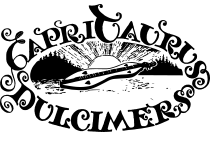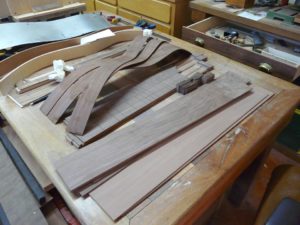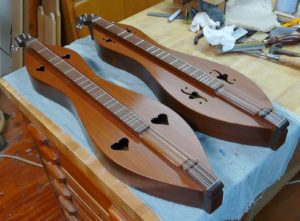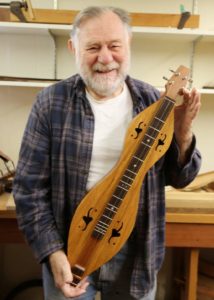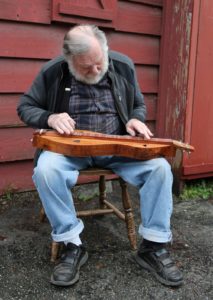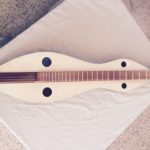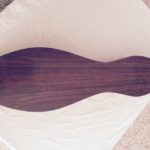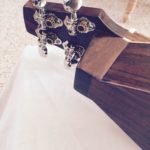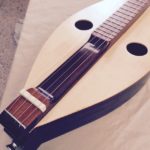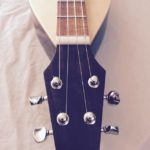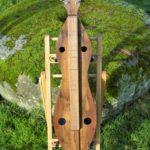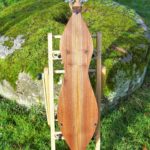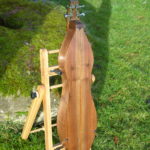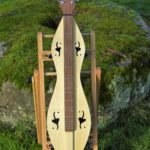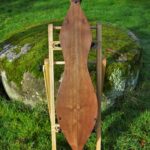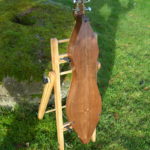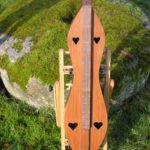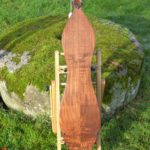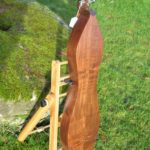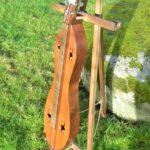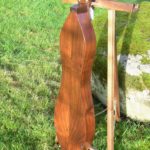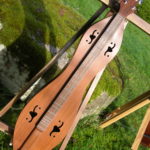NEW CapriTaurus Dulcimers
In 2011, Howard Rugg – the co-founder of Capritaurus and FolkRoots dulcimers – decided to start building again under the CapriTaurus name. This time his aim was to build just a small quantity of handmade dulcimers, rather than the mass-market range of previous incarnations.
Howard was a wood worker and antique restorer in Felton, California, when in 1968 he rented a cottage to two hippies who were making dulcimers. “They were making funky dulcimers. I was not a luthier, just a craftsman, but I believed I could do a better job. I had no training in dulcimer making – I figured it out myself. No one gave me a clue about intonation adjustment. People began requesting intonation adjustments when our dulcimers got popular!” The name CapriTaurus was a combination of the star signs of Howard (Capricorn) and his brother/early business partner Michael (Taurus). Most of the dulcimers Capritaurus sold at this time were made from laminated wood, which was stable, easy to handle and cheap. The early ones had violin pegs.
In 1973, the partnership was augmented by Steve Jackel, a sociology and anthropology graduate from Chicago, who fell into dulcimer making by accident! The workshop created a new brand, Folk Roots, for their standard, affordable dulcimers, based on the original Capritaurus design. A few years later, Michael bowed out and the longstanding Rugg and Jackel partnership began.
Dulcimer players worldwide have a great fondness for these R&J Folk Roots dulcimers. Cheap they may have been, but even the most modest had good intonation and playability. The 29” scale length and big bodies, with deep sides, gave good balance and ample volume – the Holy Grail for most mountain dulcimer players! All are good dulcimers, albeit plain-looking, and the solid wood ones are particularly desirable instruments. These are dulcimers to be played like guitars, to be strummed on beaches and in bars. Howard’s design was crucial in developing this new tradition of dulcimer-playing and dulcimer-making, where picks/fingers and chords rather than noters and drones were the norm; where machines and jigs replaced the individual craftsperson with their hand tools.
But, by the end of the 1980s, dulcimers were no longer the height of fashion. Howard Rugg and Steve Jackel decided to end their partnership and in 1989 sold the business to Folkcraft – who, incidentally, still produce several Folk Roots models based on essentially the same body as the 1969 Capritaurus. Between 1968, when he saw and made his first dulcimer, and 1989, when the business was sold to Folkcraft, Howard estimates that he and his team built upwards of 20,000 dulcimers. Howard returned to his first trade and began a twenty year career as an antiques restorer.
As a whole new generation of players discovered these early dulcimers in the new Millennium, Howard was pestered for information about them. His curiosity piqued, in 2011, Howard decided to start building again under the CapriTaurus name. This time his aim was to build just small batches of handmade dulcimers, rather than the mass-market range of previous incarnations. He decided to use up his remaining stock of naturally-aged timber, much of it over 30 years old. He still had Californian-grown walnut, displaying a beautiful dark reddish chocolate brown colour, with wavy grain figures and an occasional purple cast. Redwood for tops came from first growth timber recycled from a 19th century water tank.
The new designs have much in common with the high end instruments produced by Capritaurus and Folk Roots in the 1970s and 1980s – why mess with success? They retain the typical big voice and deep bodies but, in line with changing tastes, the new dulcimers have shorter scale lengths – a choice of 26” or 27”. The fancy dulcimers have scroll headstocks, like top-end Capritaurus instruments from the early 1970s, wood binding and an ebony fret board veneer. The plainer California models have a flat headstock and walnut fret board veneer, but retain the beautiful bookmatched walnut backs and sides, and straight-grained old-growth redwood tops. CapriTaurus also have a new model, the Wally, based on a 23” scale for playing in standard DAD or GDG (with different string gauges) – rather like the well-known McSpadden Ginger. It plays easily and is particularly suitable for those with smaller or less powerful hands. Unlike most short-scale instruments, however, it has a surprisingly big voice.
CapriTaurus California prototype dulcimers #001 and #002 – before and after assembly
Howard Rugg of CapriTaurus Dulcimers with prototype Wally short-scale model
2.276 (Ex-2.124) Capritaurus Wally #008 January 2017 Short-Scale, chromatic, 4 equidistant strings £355 + NEW padded case £25
Printed label with writing inside framed edge: “CapriTaurus/ WALLY/ #008 Date 16/01/2017/ [signed] HRugg”.
California walnut back and sides, spruce top, koa overlay on fretboard. Fully chromatic fretboard with 23″ VSL and four equidistant string layout (nut and saddle are only slotted for equidistant string spacing). Headstock, fretboard, and tailpiece made of walnut; bone nut and saddle; Grover Sta-Tite 14-1 ratio chrome professional tuners; strap buttons on both ends. Hand signed label on inside. Simple circle soundholes. Overall length 29½”, upper bout 5⅛”, lower bout 7”, depth 2¼”, FBW 1½”, VSL 23″ (short), weight 1lb 8oz (686g). Chromatic frets. Original strings tbd.
These small instruments pack a considerable punch, projecting well and providing clear notes with some sustain – certainly none of the dullness often found in shorter scale dulcimers. Original price $560 plus shipping. Previously owned by Duncan Gibbs, UK dulcimer maestro.
Click on thumbnails below to enlarge.
4.22 Capritaurus Wally #009 4 String 3 Course Hourglass £Sold
Printed label with writing inside framed edge: “CapriTaurus/ WALLY/ #009 Date 02/02/2017/ [signed] HRugg”.
Beautifully coloured Californian walnut – brown, purple, yellow – bookmatched back, sides and top. The trade-off for the spectacular colouring is that the board clearly had a few small insect trails in it which have required filling (most close to the fingerboard and none on the back). The soundholes are simple circles. Short walnut headstock with open-geared Grover tuners; walnut fingerboard (no overlay); zero fret with rosewood (?) nut/guide and compensated bridge; 6+ and 13+ frets. Strings run through the high walnut tail and across the end of the fingerboard, using a fret as a strainer. The layout is designed to use only ball-end strings. Three small rubber feet on the back to support dulcimer so it can be played on a table. Overall length 29½”, upper bout 5½”, lower bout 7”, depth 2¼”, FBW 1½”, VSL 23″ (short), weight 1lb 8oz (687g). 6+ and 13+ frets. Original strings 12/12, 16, 24w.
Slightly heavier strings than #012, perhaps to compensate for the quieter walnut body. Makes for a balanced and attractive sound.
Click on thumbnails below to enlarge.
4.23 New Capritaurus Wally #012 February (2017) 4 String 3 Course Hourglass £Sold
Printed label with writing inside framed edge: “CapriTaurus/ WALLY/ #012 Date 02/19/2017/ [signed] HRugg”.
Neat, scaled-down version of the standard Capritaurus model, built with deep sides and a light body. Bookmatched walnut body with fine-grained spruce top and stylised f-heart soundholes. The hollow fingerboard is also spruce, with a walnut capping. 6+ and 13+ frets, no dot markers. Zero fret, with rosewood “nut” and deep (compensated) bridge. Strings run through the high walnut tail and across the end of the fingerboard, using a fret as a strainer. The layout is designed to use only ball-end strings. Small, neat flat headstock with quality open-geared chrome Grover tuners. The back has three small black plastic feet so that the dulcimer can be played on a table. Overall length 29½”, upper bout 5⅛”, lower bout 7”, depth 2¼”, FBW 1½”, VSL 23″ (short), weight 1lb 8oz (686g). 6+ and 13+ frets. Original strings 10/10, 13, 24w.
These small instruments pack a considerable punch, projecting well and providing clear notes with some sustain – certainly none of the dullness often found in shorter scale dulcimers. The intonation is a little sensitive, but it has a low action with relatively light strings. Would be ideal therefore for someone with smaller or less powerful hands.
Click on thumbnails below to enlarge.
4.20 Capritaurus California #001 October 2017 4 String 3 Course Hourglass £Sold
Printed sepia label with scroll border: “CapriTaurus/ Felton California/ since [logo] 1969/ “California” #001 10/22/17/ [signed] HRugg”.
One of two prototypes of a new Capritaurus model. Simple design but made from rich, fully bookmatched Californian walnut (sides and back) and thin, very straight-grained, old growth redwood (top). Big heart-shaped soundholes, pointing to tail. Neat flat headstock, fitted with chrome Grover 14:1 tuners. Fingerboard is redwood with a brown mahogany (?) overlay; 6+ and 13+ frets, no fret markers. Ball end strings run through the body/tail, over a strainer (made from a fret) to a deep rosewood (?) bridge. “Nut” also rosewood with zero fret. Overall length 35″, upper bout 6¼”, lower bout 8”, depth 2½”, FBW 1½”, VSL 27″ (medium), weight 1lb 15oz (896g). 6+ and 13+ frets. Original strings 10/10, 14, 25w.
An impressive dulcimer, both in looks and sound. Very direct, punchy sound.
Click on thumbnails below to enlarge.
2.185 (previously 4.21) Capritaurus California #002 October 2017 4 String Hourglass £Sold
Printed sepia label with scroll border: “CapriTaurus/ Felton California/ since [logo] 1969/ “California” #002 10/25/17/ [signed] HRugg”.
One of two prototypes of a new Capritaurus model. Simple design with no frills, but made from some beautifully coloured and grained Californian walnut, with an aged, straight-grained redwood top. Stylised f-heart soundholes, a small but neat flat headstock and chrome Grover 14:1 tuners. Has a redwood fingerboard with walnut capping, 6+ and 13+ frets and a chunky rosewood “nut” (with zero fret) and (compensated) bridge. Simple but elegant walnut tail, through which the strings pass, protected on top by a strainer made from a fret. This design will only work with ball end strings. Overall length 33¼”, upper bout 5⅝”, lower bout 7⅞”, depth 2½”, FBW 1½”, VSL 26″ (short/medium), weight 1lb 14oz (854g). 6+ and 13+ frets. Original strings 10/10, 14, 24w.
A really handsome dulcimer with a forward sound and some considerable volume when pushed. Crisp and clearly articulated sound, good intonation and sings out well into the second octave. Shorter scale length and low action make it very easy to play. A good professional dulcimer. Sold new in 2018, this has come back in pristine, as-new condition and now offers a considerable saving on the new price.
Click on thumbnails below to enlarge.

